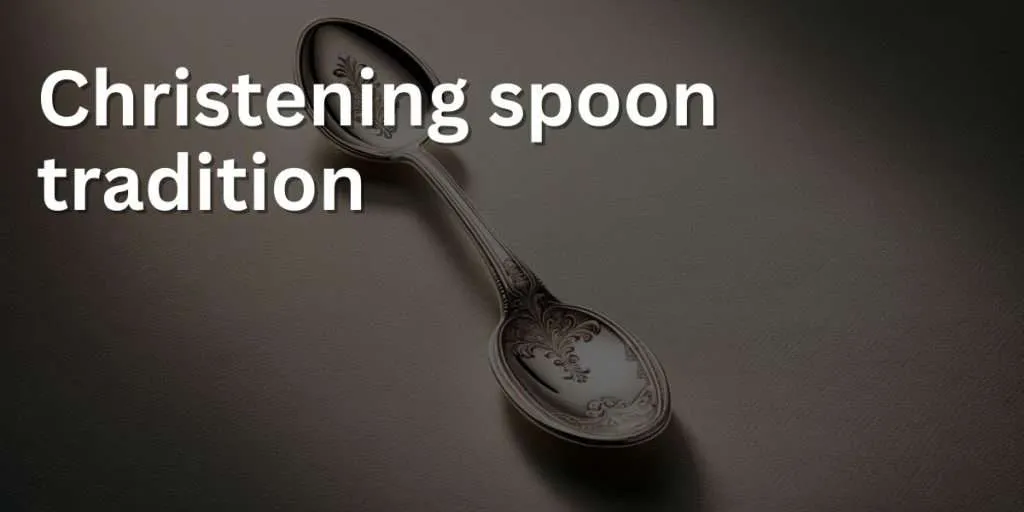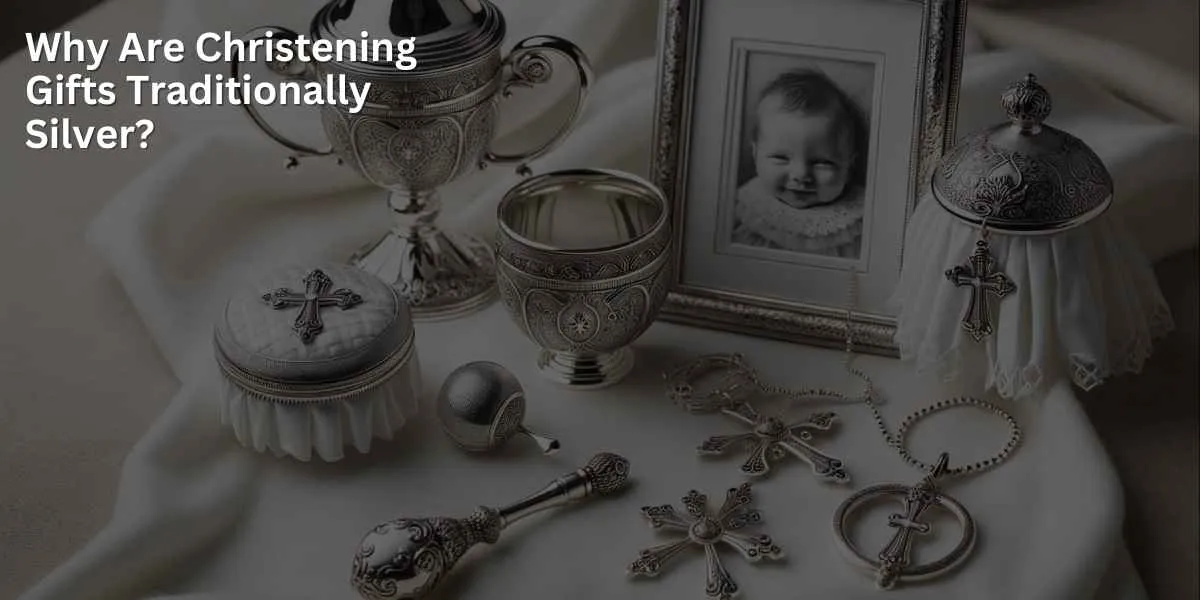The tradition of giving silver gifts for christenings dates back centuries and holds a fascinating place in cultural history.
This article delves into the reasons behind the enduring tradition of silver as the preferred choice for christening gifts. We’ll explore the historical significance of silver, its symbolic meanings, and how these have evolved to fit contemporary practices. From its association with wealth and purity to its durability and heirloom qualities, silver’s role in christening ceremonies is rich with symbolism.
Understanding the roots of this tradition can add a layer of meaning to the act of giving and receiving christening gifts, making these occasions even more special.
Key Takeaways: Christening Gifts Traditionally Silver
- Silver symbolizes purity and clarity. In many cultures, silver is associated with purity, making it a fitting choice for a christening, which is a ceremony of spiritual purification.
- Silver has historical significance in religious contexts. Historically, silver was used for religious artifacts, linking it to spiritual and religious ceremonies like christenings.
- Silver gifts are seen as timeless keepsakes. Their durability and resistance to tarnish make silver items ideal as keepsakes that can be treasured for a lifetime.
- They represent a valuable investment in the child’s future. Silver items are not only symbolic but also have intrinsic value, representing an investment in the child’s future.
- Silver is associated with wealth and prosperity. Gifting silver at a christening is often seen as a wish for a prosperous and successful life for the child.
- Engraving on silver adds a personal touch. The ability to engrave silver makes it a popular choice for personalized gifts that carry special significance.
Why are christening gifts traditionally silver?
The tradition of godparents and gift-giving dates back to the fourth century when new members of the church, including babies, would have to be sponsored by existing members. This came from a fear of persecution by non-Christians. Parents would ask friends and family within the church to become godparents and a christening gift would be given to symbolise the presents given to Jesus by the three kings.
The tradition of giving silver didn’t really come about until Tudor and then Victorian times when silver was given because it had value as a currency and was seen as a good investment on behalf of the child. Giving a silver gift symbolised stability for children in their later years.
The saying “born with a silver spoon in your mouth” implies a child who was born into wealth. This saying is actually thought to have come from the middle ages when parents encouraged their children to suck on a silver spoon to ward off the plague. Thanks perhaps to the antibacterial effects of silver wealthier children who had silver spoons survived.
The Tudor tradition of giving apostle spoons, silver spoons engraved with the images of the apostles could also account for the saying and the giving of a silver spoon as a traditional Christening gift.
In Victorian times silver spoons remained popular alongside other gifts such as christening cups, silver egg cups, music boxes, and silver rattles.
Traditional and modern silver gifts
Although in modern times your godchild is unlikely to eat from the silver spoon or drink from the silver cup you give them they still make nice keepsakes. Although maybe they should use them thanks to the antibacterial properties of silver. Neither are they likely to play with a silver rattle.
We do however like the idea of silver money box you can empty your change into when you see them, and who wouldn’t want a silver bubble blower? You get to delight the child with bubbles on the day and they get a gift they can treasure forever! Plus it’s got to be more eco-friendly than the hundreds of plastic bubble blowers they might get through in a lifetime.
A special coin set could be another nice gift with a nod to tradition. Commemorative coins from the royal mint with the year of their birth make a lovely gift. And 2019 coins include Peter Rabit, Paddington Bear and the Gruffalo all of whom are likely to be pretty exciting to the baby at some point in their lives.
This also relates to another tradition of crossing a baby’s palm with silver, with the saying being that if they grab the coin they will be frugal and if they drop the coin they will be free.
You can find silver gifts starting quite cheaply if you wanted to stick with tradition or spend hundreds if you opt for a Tiffany bubble blower or similar.
What is a traditional christening gift?
A traditional christening gift is often something sentimental and timeless that can be cherished for years to come. These gifts are usually chosen for their lasting value and their ability to commemorate the special occasion of a christening or baptism. One of the most classic choices is a silver item, like a cup, spoon, or a rattle. Silver gifts have a long-standing tradition in christenings due to their enduring quality and the symbolism of purity and strength.
- Silver items symbolize purity and blessings. Items like silver spoons or cups are traditional gifts, representing good wishes for the child’s future.
- Personalized keepsakes create lasting memories. Engraved photo frames or customized jewelry boxes become cherished items as the child grows older.
- Religious items reflect the spiritual significance of the occasion. Gifts like children’s Bibles or cross pendants are common to celebrate the religious aspect of a christening.
- Savings bonds or investments offer a financial head start. These gifts can help with future educational expenses or significant life events.
- Classic children’s books encourage a love for reading. Gifting timeless books can instill a lifelong passion for literature and learning.
- Soft toys and blankets provide comfort and security. These gifts often become sentimental favorites for the child.
- Clothing for special occasions adds practical value. Outfits for future events or larger sizes for growth are both thoughtful and useful.
- Handcrafted items show personal dedication. Hand-knitted blankets or handmade toys are unique gifts that carry a personal touch.
Another popular choice is a piece of jewelry, such as a bracelet or a necklace with a religious symbol like a cross. This kind of gift is not only beautiful but also serves as a reminder of the child’s spiritual journey. For a more personal touch, these items can be engraved with the child’s name and the date of the christening.
Religious items also make meaningful gifts. A beautifully illustrated Bible, a rosary, or a religious icon can be a thoughtful way to introduce the child to their faith. These gifts can be used as the child grows older and starts to explore their religious heritage.
Consider these when choosing baptismal gifts:
- Longevity: Choose a gift that can stand the test of time and be appreciated even as the child grows older.
- Personalization: Adding a personal touch, like engraving, can make the gift more special and memorable.
- Appropriateness: Ensure the gift is suitable for the family’s religious and cultural practices.
- Practicality: While traditional gifts are often keepsakes, considering something practical that can be used in the child’s early years can also be thoughtful.

What is history of the christening spoon tradition?
The tradition of giving a spoon as a christening gift has a rich and fascinating history, rooted in both cultural and religious significance. This practice dates back to the medieval times and has evolved over the centuries. Originally, the christening spoon, often referred to as an apostle spoon, was a popular gift among the wealthy in Europe, particularly in England.
Apostle spoons were named so because they typically featured the figure of an apostle or a patron saint at the handle. These spoons were not just ordinary utensils; they were crafted with exquisite detail and were made of precious metals like silver or even gold. The choice of the apostle often held personal significance, such as the patron saint of the child’s name or birth month.
The number of spoons given would depend on the giver’s wealth and closeness to the child. It was common for godparents to give a set of these spoons, with wealthier sponsors giving a complete set of twelve, representing each of the apostles. For those less affluent, a single spoon, often featuring the figure of Jesus or the patron saint associated with the child, would be gifted.
Over time, as the production of these elaborately designed apostle spoons became less common, the tradition evolved. The symbolic gesture remained, but the design of the christening spoons became simpler. Today, a silver spoon gift at a christening still holds symbolic value. It represents a wish for prosperity and good health for the child.
- Historical significance: Understanding the rich history behind the gift adds depth and meaning to the present.
- Cultural variations: The tradition of the christening spoon might vary in different cultures and denominations, so it’s interesting to explore these differences.
- Modern adaptations: While traditional designs are less common now, modern silver spoons often maintain a sense of elegance and are sometimes engraved to personalize the gift.
- Symbolic meaning: The christening spoon is not just a gift but a symbol of hope and blessings for the child’s future.

Modern Silver Christening Gifts
In contemporary times, silver christening gifts have maintained their popularity, symbolizing purity, clarity, and sophistication. Modern silver gifts for christenings often blend traditional symbolism with contemporary designs and practicality.
A popular choice is a silver picture frame, often engraved with the child’s name and christening date. This allows the family to capture and display a cherished moment from the christening day, creating a lasting keepsake.
Another modern twist is a silver money box or piggy bank. This gift not only serves as a beautiful decorative piece in a child’s room but also encourages the concept of saving from an early age. Some money boxes come in playful shapes and designs, making them both a practical and fun gift.
Silver jewelry remains a timeless gift, with options such as a delicate bracelet or a small pendant. Modern designs can be simpler and more contemporary, suitable for the child to wear as they grow older. Personalization, such as including the child’s birthstone or an initial, adds a thoughtful touch to the jewelry.
For those looking for a more traditional item with a modern twist, a silver baby rattle or a teething ring can be a perfect choice. These items often combine silver with other safe materials and feature contemporary designs that are both elegant and child-friendly.
Things to Consider:
- Personalization: Engraving the gift with the child’s name or christening date adds a personal touch.
- Functionality: Consider gifts that can be used as the child grows, like jewelry or money boxes.
- Quality: Ensure that the silver is of good quality, especially for items like jewelry or utensils that might be used frequently.
- Safety: For items intended for use by the child, like rattles or teething rings, safety should be a top priority. Ensure that these items are made from safe, non-toxic materials and have no small parts that could be a choking hazard.
Silver Christening Cups
Silver christening cups are a time-honored and elegant gift choice, embodying both tradition and luxury. These cups, often made of sterling silver, serve as a lasting keepsake that can be passed down through generations. Their classic design and enduring material make them a favored choice for commemorating the special occasion of a christening.
The design of silver christening cups often leans towards the traditional, featuring intricate engravings or delicate patterns. Some may include religious motifs, such as crosses or angels, while others might be adorned with more general but equally elegant designs like floral patterns or simple lines. Personalization is common, with many opting to engrave the child’s name, christening date, or a special message onto the cup.
In terms of practicality, while these cups are a keepsake item, they are also crafted to be used if desired. High-quality silver cups are durable and safe for use, making them a functional gift as the child grows older. However, most families choose to keep these cups as decorative items or heirlooms rather than using them for daily purposes.
Things to Consider:
- Durability: High-quality silver ensures the cup remains a lasting keepsake.
- Design: Choose a design that is timeless and, if desired, reflects religious or personal significance.
- Engraving: Personalizing the cup with engraving can make the gift even more special and memorable.
- Care and Maintenance: Silver can tarnish over time, so it’s important to consider how the cup will be cared for to preserve its beauty. Providing instructions or materials for proper care can be a thoughtful addition to the gift.
FAQs on Silver Christening Gifts
Why do you give silver for a christening?
Giving silver for a christening is a long-standing tradition symbolizing good luck and wealth for the child’s future. Silver, often considered a precious and durable metal, is seen as a valuable and lasting gift, symbolizing the wish for the child to have a prosperous life. This custom has roots in history and folklore, where silver was believed to bring protection and fortune.
Why do godparents give silver?
Godparents give silver to their godchild during a christening as a token of commitment to their spiritual and overall well-being. This tradition stems from the belief in silver’s purity and value, representing a significant and enduring gift. The act of giving silver, such as a spoon or a cup, is a meaningful gesture symbolizing the godparent’s role in nurturing the child’s future.
Why do people give silver baby cups?
People give silver baby cups as christening gifts due to silver’s historical association with health and wealth. Silver is antimicrobial, which historically made it a practical choice for children’s items. The giving of a silver baby cup is symbolic, representing wishes for a healthy and prosperous life for the child. It’s a cherished, timeless keepsake that often becomes a family heirloom.
What is the etiquette for christening gifts?
The etiquette for christening gifts involves presenting something meaningful and lasting to the child. Traditional gifts include silver items, such as spoons or cups, which symbolize good fortune and health. However, the gift should align with the giver’s relationship to the child and their family. Personalized or religious items, savings bonds, or contributions to a college fund are also appropriate.
















